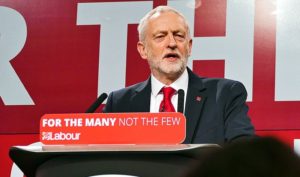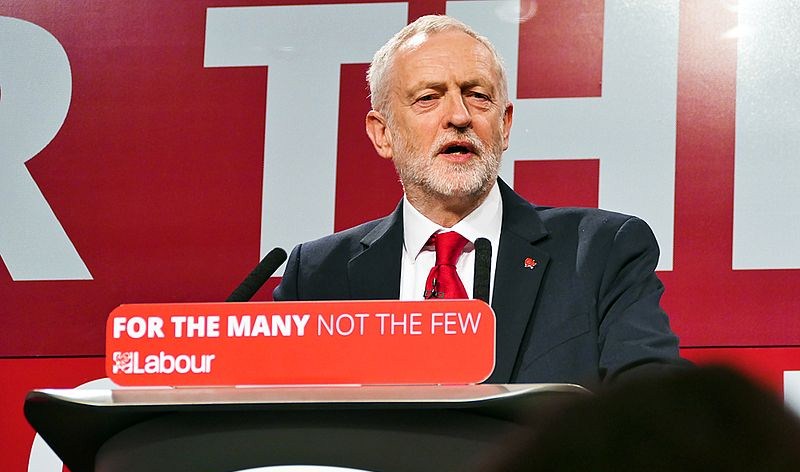05 April 2018
Labour’s Anti-Semitism
How dangerous is it?
By John Watson
 As the row about anti-Semitism in the Labour Party runs on, a poll of members shows that 61% believe that Jeremy Corbyn has done well in dealing with the issue. Well, they would say that, wouldn’t they? The poll also found that 65% of members thought that Israel was a force for bad, compared to 26% who thought the same of the UK. These polls say more about Labour Party members than about the success or otherwise of Mr Corbyn’s performance in combatting racism.
As the row about anti-Semitism in the Labour Party runs on, a poll of members shows that 61% believe that Jeremy Corbyn has done well in dealing with the issue. Well, they would say that, wouldn’t they? The poll also found that 65% of members thought that Israel was a force for bad, compared to 26% who thought the same of the UK. These polls say more about Labour Party members than about the success or otherwise of Mr Corbyn’s performance in combatting racism.
But it’s that sort of a row isn’t it? Mr Corbyn’s friends defend his performance on the issue. His enemies use the issue to attack him. No surprises, so far. Nevertheless, the issue has only generated the momentum it has because there is something there. The question is, what?
I don’t think many people think that Mr Corbyn himself is anti-Semitic. It is true that he has associated himself with anti-Semitic groups and that his claim that he did not really understand the significance of the racist mural which he endorsed rings rather hollow, but his personal reputation in the racially mixed area which he represents is high, and that would hardly be the case if he was a racial bigot.
His party, however, is a different matter. In the past there has been much Jewish support for Labour but for many years certain left-wing groups have let their pro-Palestinian sympathies draw them into anti-Semitism. One of the jobs of the leader of any political party is to marginalise and expel members who hold undesirable views, and the time was when the leadership of the Labour Party could be relied upon to do that. Indeed they famously expelled a number of party members who belonged to the Trotskyist group Militant in 1986. It seems that they can be relied on no longer, at least where the issue is anti-Semitism, either because the leaders do not appreciate its importance or extent, or because they have no wish to expel groups whose votes may help them to power. One can only hope that it is for the first of these reasons rather than the second.
Whatever the reasons for it, the leadership’s apparent willingness to turn a blind eye (or at least quite a blind eye, depending how much credence you give to the conclusions reached in the Chakrabarti report) to racism or other extremism within the party poses a danger to the public. One issue which will be discussed at the Party Conference is that of reselection, the replacement of the more traditional Labour MPs with those more in tune with the leadership’s radicalism.

In politics it is quite usual for new MPs of all parties to be more radical than those they replace. If you are charitable, you say that this is because of their ideals which have not yet been tarnished by the experience of practical politics. That is to be kind. The real reason is usually that they are on the make and that taking a radical line is a good way to get noticed. Indeed, it is often the way they managed to get themselves selected, and that would be particularly the case if they had been brought in as the replacement for a more traditional politician who had been deselected. One can expect, therefore, that the cohort of new Labour MPs will be much more radical than those who contested the last election and that they will bring their intolerance and racism with them. Does that matter? Policy is not made by the grassroots members but by the Cabinet – provided that those at the top of the party are sensible, so what if there are a few hotheads underneath? To ask that question is to misread the situation.
It is when you begin to think about numbers that all this becomes alarming. Even if you do not agree with all Mr Corbyn’s views, it is hard to deny that some of the abuses to which he points are real and you might go on from this to think that it would be a good thing if he had a chance to clear up some of the mess. So far so good. But that is quite a different thing from letting the more extreme elements of his party run the country bringing their intolerance and anti-semitism in their wake; if the deselection program is thorough enough that is precisely what could happen. After all, it has happened before.
In 1981 Labour won the Greater London Council from the Conservatives. The leader of the Labour Group was the moderate Andrew McIntosh and the public who narrowly voted for a Labour administration naturally assumed that he would be the new leader of the GLC. The day after Labour’s victory, the Labour group on the GLC, no doubt taking the view that McIntosh had served his purpose, voted to replace him with the extremist Ken Livingstone. Look at the similarity between the position then and the position we might be in if Labour win the next general election with a large majority. It is not likely, of course, that Mr Corbyn will be sacked the next day, but his government would be in hock to the new entryist members and, being well organised, it is they who would drive the agenda. In these circumstances the anti-Semites of the far left could have far more power than is healthy in a multiracial democracy.


